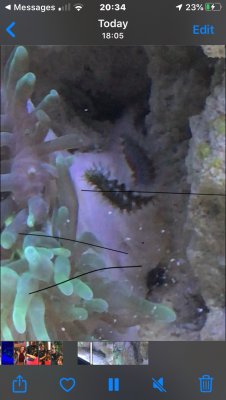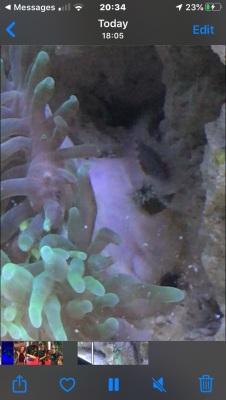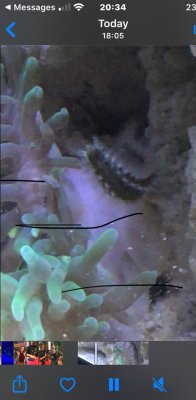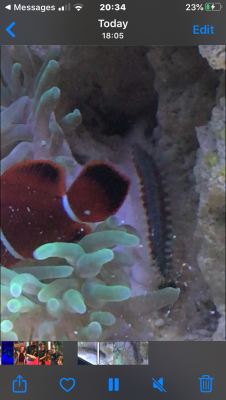Navigation
Install the app
How to install the app on iOS
Follow along with the video below to see how to install our site as a web app on your home screen.
Note: This feature may not be available in some browsers.
More options
You are using an out of date browser. It may not display this or other websites correctly.
You should upgrade or use an alternative browser.
You should upgrade or use an alternative browser.
Good worm or bad worm?
- Thread starter Dsdman
- Start date
- Tagged users None
@Lovemyreef2015 @DSC reef @KJ thoughts. @Dsdman I found the best way for video is to upload to YouTube and post link in the forum. I can't see video
Crabs McJones
I'm so shi-nay
View Badges
Excellence Award
Reef Tank 365
Article Contributor
Moderator Emeritus
Hospitality Award
Reef Tank 365 Boss
Wisco Reefers
My Tank Thread
Fireworm. Remove it.
Throw a piece of shrimp into It. I'm sure it will come to itDangit, I’ve tried to catch him with a bottle and straw trap. He not interested in it. I’ll keep trying. I was hoping he might be a good worm.
Agree.Fireworm. Remove it.
reef lover
It's a reef thing....
View Badges
Excellence Award
Reef Tank 365
Hudson Valley Reef Keepers
Hospitality Award
518 Reefers
My Tank Thread
+2
- Joined
- Oct 25, 2019
- Messages
- 152
- Reaction score
- 197
Shape.. and the redTried the shrimp in a bottle trap last night, no luck. So how do you know it’s a fire worm (bad) and not a good trash eating bristle worm (good)
reef lover
It's a reef thing....
View Badges
Excellence Award
Reef Tank 365
Hudson Valley Reef Keepers
Hospitality Award
518 Reefers
My Tank Thread
This pic is going to be priceless in helping id fires from bristles!!

vetteguy53081
Well known Member and monster tank lover
View Badges
Partner Member 2024
Excellence Award
Reef Tank 365
RGB
Article Contributor
Tampa Bay Reef Keepers
West Palm Beach Reefer
Hospitality Award
Ocala Reef Club Member
305 Reef Club
Wisco Reefers
Midwest Reefer
Fish Medic
MAC of SW Florida
Rock Pool Reef Keepers
R2R Secret Santa 2023
My Tank Thread
My Aquarium Showcase
Ouch. Do not touch with hands. Remove with large tweezers or make a trap or use fish trap and bait it.
I've seen those same worms in my tank. They do get large. Largest I've seen stretched out is about 14". However, I have not had a single problem from them being in there. They haven't eaten any corals or attacked any other livestock. Pretty sure the only concern with them is touching them and getting stung. That said, I do pull any large ones out and put them in my hitchhiker/unwanted creatures tank but haven't seen any in months.
vetteguy53081
Well known Member and monster tank lover
View Badges
Partner Member 2024
Excellence Award
Reef Tank 365
RGB
Article Contributor
Tampa Bay Reef Keepers
West Palm Beach Reefer
Hospitality Award
Ocala Reef Club Member
305 Reef Club
Wisco Reefers
Midwest Reefer
Fish Medic
MAC of SW Florida
Rock Pool Reef Keepers
R2R Secret Santa 2023
My Tank Thread
My Aquarium Showcase
Only Concern?I've seen those same worms in my tank. They do get large. Largest I've seen stretched out is about 14". However, I have not had a single problem from them being in there. They haven't eaten any corals or attacked any other livestock. Pretty sure the only concern with them is touching them and getting stung. That said, I do pull any large ones out and put them in my hitchhiker/unwanted creatures tank but haven't seen any in months.
These fireworms are roving carnivores that can cause much damage in a reef tank. They have toxic bristles on their bodies that can inflict a sting of a very painful degree, possess strong jaws for feeding, and can reproduce quite rapidly.
They are not selective about what they eat but usually prey on all types of other moving and stationary invertebrates, such as corals, crustaceans, mollusks, as well as other errant type bristleworms. Being particularly aggressive predators, they may even eat small fish if an opportunity presents itself.
For these reasons preventing and removing these destructive worms from accidentally getting into tank and removing them when found in a saltwater aquarium system is recommended. They come into tank as hitchhikers.
Only Concern?
These fireworms are roving carnivores that can cause much damage in a reef tank. They have toxic bristles on their bodies that can inflict a sting of a very painful degree, possess strong jaws for feeding, and can reproduce quite rapidly.
They are not selective about what they eat but usually prey on all types of other moving and stationary invertebrates, such as corals, crustaceans, mollusks, as well as other errant type bristleworms. Being particularly aggressive predators, they may even eat small fish if an opportunity presents itself.
For these reasons preventing and removing these destructive worms from accidentally getting into tank and removing them when found in a saltwater aquarium system is recommended. They come into tank as hitchhikers.
I haven't had the same experience. Have you had these in your tank? Same exact type? Or is this just from what you've read.
The worm pictured really looks more like a large polycheate to me.
vetteguy53081
Well known Member and monster tank lover
View Badges
Partner Member 2024
Excellence Award
Reef Tank 365
RGB
Article Contributor
Tampa Bay Reef Keepers
West Palm Beach Reefer
Hospitality Award
Ocala Reef Club Member
305 Reef Club
Wisco Reefers
Midwest Reefer
Fish Medic
MAC of SW Florida
Rock Pool Reef Keepers
R2R Secret Santa 2023
My Tank Thread
My Aquarium Showcase
Owning a pets store for almost 12 years, you come across many critters such as these. I had a clarity plus bin type display and had two in it as this system held my live rock and corals. Had missing fish before these were discoveredI haven't had the same experience. Have you had these in your tank? Same exact type? Or is this just from what you've read.
Owning a pets store for almost 12 years, you come across many critters such as these. I had a clarity plus bin type display and had two in it as this system held my live rock and corals. Had missing fish before these were discovered
I've seen worms that look exactly like the ones in the op pic in my tank. No missing fish or anything actually. I do pull out the ones that are easy to grab. I have my old phone charging. Pretty sure I have pics of what I've found in my tank. I'll post up some pics once it's got some battery life.
Not saying to leave them in. If in doubt, take it out. I just don't think all large worms deserve the pitch forks and burn with fire type of responses.
Here's what I've seen in my tank. As of 5 minutes ago. These haven't bothered anything other than uneaten food.




Similar threads
- Replies
- 11
- Views
- 201





















